Students Make Impact on Community, Develop Professional Skills through ACE Campus Food Pantry
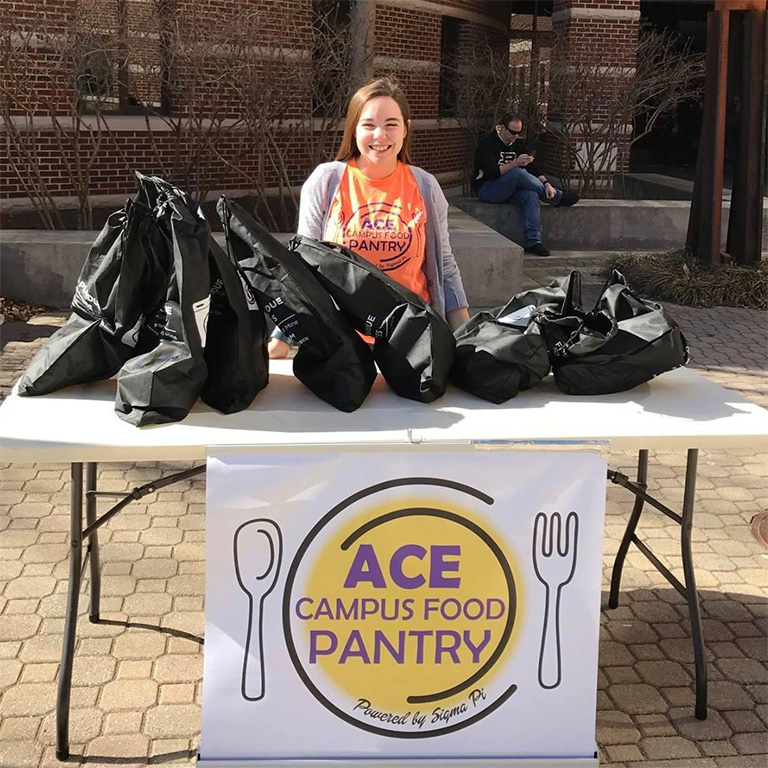
For the past seven years, students have led the fight against food insecurity in the Purdue community through the ACE Campus Food Pantry. Established in 2015, the pantry makes food more readily available to members of the Purdue community who may be facing temporary or long-term food insecurity.
With 11 student directors and more than 200 annual volunteers, the pantry allows Boilermakers to gain hands-on experience in service while making an impact on their immediate community. Marly Beck, a 2020 graduate and former student director of the pantry, explains that getting involved with ACE aligned with her passion for food justice.
“Food is a universal need,” Beck says. “It’s something we can come together around, but also express ourselves through. It’s a unifier but also an expression of independence. The togetherness it can create is really meaningful and important to me. I think food justice makes so much sense – everyone deserves a right to food – and I was really lucky that the pantry could use help.”
The p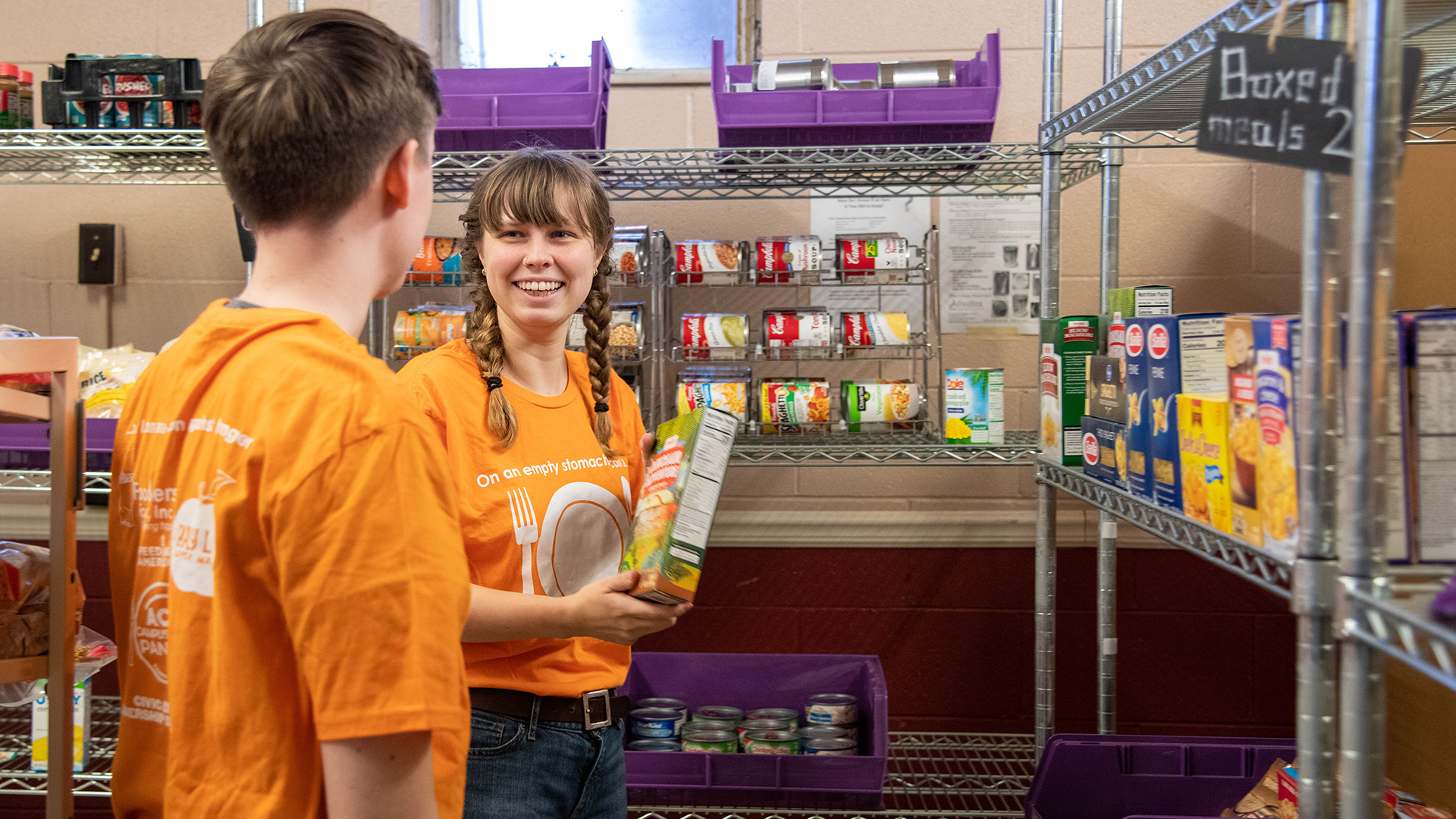 antry began when John Baier, a member of the Eta Chapter of Sigma Pi fraternity at Purdue, sought opportunities for he and his fraternity brothers to make an impact through volunteer service. Melissa Gruver, senior associate director of what was then called Civic Engagement and Leadership Development (CELD, now known as the Roger Stewart Leadership and Professional Development Department - LPDD), provided Baier with information on food pantries to consider. To her surprise, Baier returned with the desire to create a pantry at Purdue.
antry began when John Baier, a member of the Eta Chapter of Sigma Pi fraternity at Purdue, sought opportunities for he and his fraternity brothers to make an impact through volunteer service. Melissa Gruver, senior associate director of what was then called Civic Engagement and Leadership Development (CELD, now known as the Roger Stewart Leadership and Professional Development Department - LPDD), provided Baier with information on food pantries to consider. To her surprise, Baier returned with the desire to create a pantry at Purdue.
Baier enlisted his sister, Nicole (Baier) St. John, to help establish ACE Campus Food Pantry as a registered student organization through CELD and Purdue Student Activities & Organizations (SAO). It took about a year of planning and coordinating with CELD, SAO, Food Finders Food Bank and filling out grants and memorandums of understanding to secure materials and a location.
ACE has grown significantly from humble beginnings – St. John recalls that the pantry was initially only open one day per week in the basement of the Baptist Student Foundation, with one pop-up location, and had about three shelves on which to store items. Gruver, St. John and members of the pantry recall feeling excited when the pantry served 10 clients per week. The pantry is now open in its permanent location two days a week, with seven pop-up locations hosted in various locations around campus weekly during the school year. The pantry now serves approximately 150 clients per week and offers events including film screenings, volunteer shifts at Food Finders Food Bank, cooking lessons and exploration of food culture.
“I did not realize how necessary it was to have a pantry on a college campus until I really got into the statistics and research of it,” St. John, a 2017 graduate, says. “To see it come to life and how useful it is for students, faculty and staff, and knowing you’re helping people who didn’t have that resource before is really rewarding.”
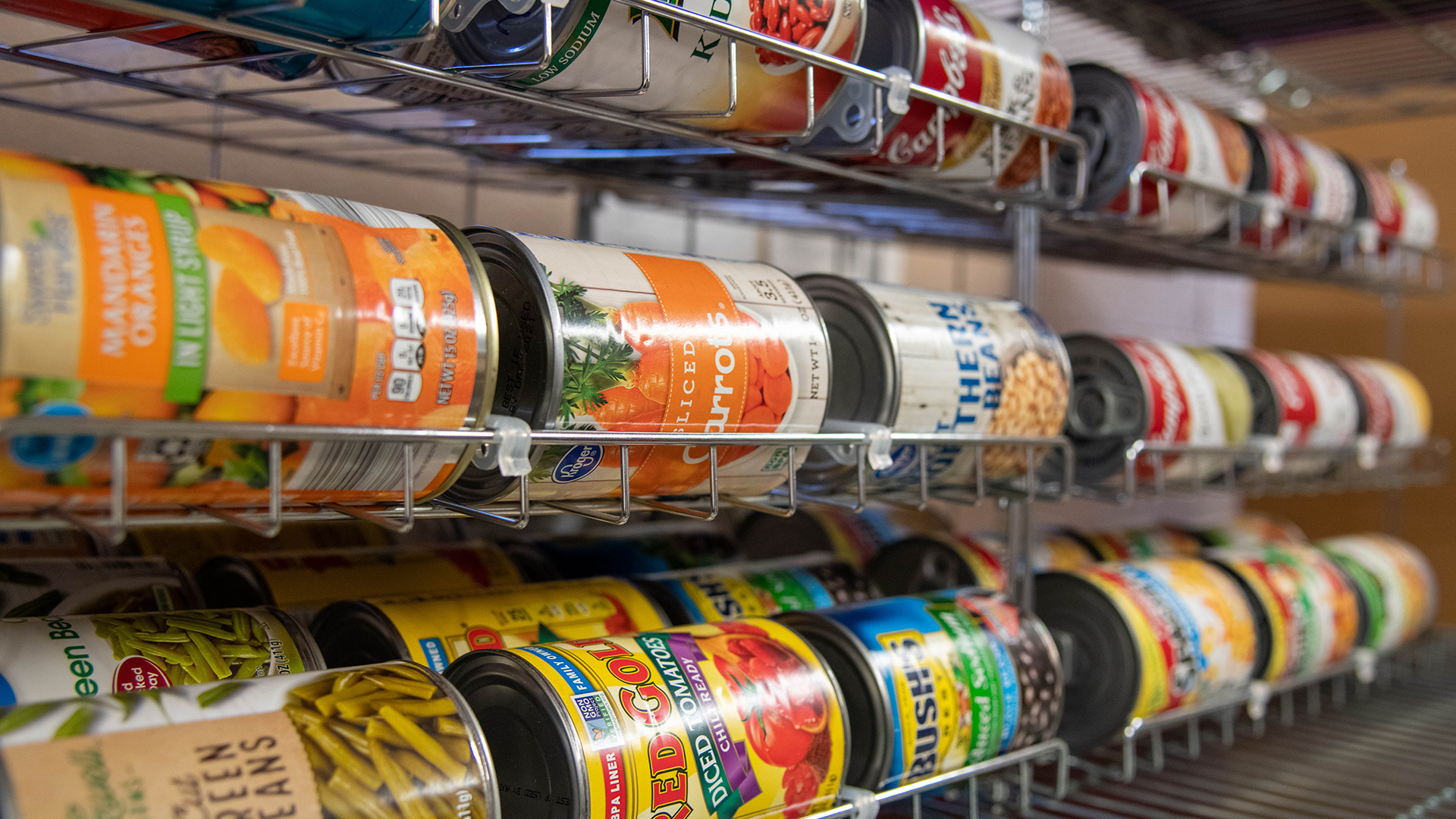 St. John, who served as director of ACE during 2016-17, has connected her passion for social service honed while launching the pantry in her career. She currently serves as a service coordinator for First Steps, Indiana’s early intervention program for children up to age 3 who would benefit from additional support to meet developmental milestones. In this capacity, she serves the Greater Lafayette community, including Purdue families. “I have a passion for helping others,” St. John says. “ACE was a good introduction to a social service area and helped guide my passion towards what I do now.” Former ACE student directors and volunteers often find themselves directly using and referring to their experiences working in the pantry as they navigate their careers. Beck, for example, has applied her passion for food justice as program manager for Tri-City Volunteer Food Bank in Fremont, California.
St. John, who served as director of ACE during 2016-17, has connected her passion for social service honed while launching the pantry in her career. She currently serves as a service coordinator for First Steps, Indiana’s early intervention program for children up to age 3 who would benefit from additional support to meet developmental milestones. In this capacity, she serves the Greater Lafayette community, including Purdue families. “I have a passion for helping others,” St. John says. “ACE was a good introduction to a social service area and helped guide my passion towards what I do now.” Former ACE student directors and volunteers often find themselves directly using and referring to their experiences working in the pantry as they navigate their careers. Beck, for example, has applied her passion for food justice as program manager for Tri-City Volunteer Food Bank in Fremont, California.
During her time with ACE, Beck helped develop connections with the Purdue Student Farm to bring seasonal, fresh produce to the pantry. She also contributed to research on food insecurity on Purdue’s campus through a course in the John Martinson Honors College. Connecting these experiences with her degree in sustainable food and farming systems provided a foundation for her career, but the culture of ACE provided additional development in leadership.
“I draw a lot from reflecting on how I engaged with other directors in the pantry,” Beck says.
“When you’re in school and engaged with students of different ages, there’s also mentorship that’s occurring. I pull a lot from people who mentored me and how I mentored other people as I approach management and working every day with volunteers. I work with volunteers of all ages, including people younger than me, and I’m definitely pulling a lot from the sense of community that we built.”
Nathan Rowland Miller is another former pantry volunteer who has applied his experiences at the pantry to his career. Miller joined ACE during his junior year as a volunteer coordinator before serving as director as a senior. He graduated in 2021 with a degree in industrial engineering and currently works as a manufacturing development associate with Conagra’s Orville Redenbacher production facility in Rensselaer, Indiana.
“I think the biggest skill I was hoping to develop was that community development aspect,” Miller says. “Creating an environment where a simple thing such as food security isn’t stigmatized and, beyond that, how to make an environment where individuals don’t have to feel uneasy or uncomfortable. I’m currently in a managerial position working with a team of individuals to create the product and I think having that experience of not only coordinating deliveries and inventory, but also as the student director working with a board of directors, helps with that team building and making individuals feel safe in addressing any concerns.”
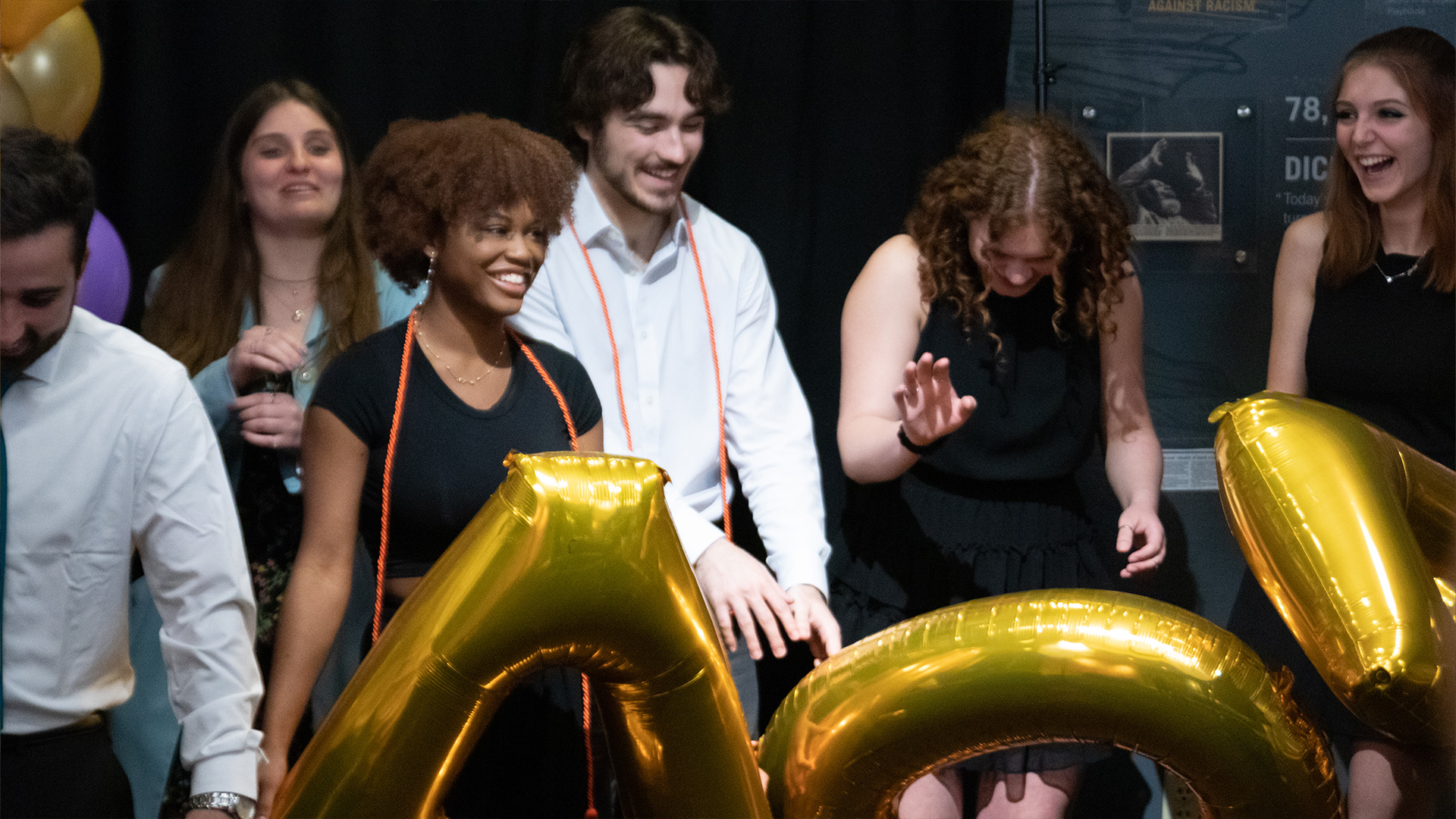
Sabria Croom, currently a graduate student pursuing a master’s in accounting and a former student director of ACE, believes the hands-on experience of leading the pantry will pay dividends in her career pursuits as well. Croom hopes to run her own business one day. “The Pantry is like a business,” Croom says. “Getting the food, tabulating inventory, arranging food pick-ups – all of that has to go into something. That’s also the aspect I enjoyed. Having the opportunity to see how hiccups could happen and being able to problem solve was important and I wasn’t by myself because I had other directors to lean on and work with.” Croom also says she plans to stay involved with the pantry while she completes her graduate studies and hopes to give back to her hometown community on the south side of Chicago by teaching students about accounting professions.
“I think the pantry also pushed me to realize that volunteering is something that I truly enjoy,” Croom says. “It brings me pure happiness.”
Beck, St. John, Miller and Croom remain engaged with ACE as members of an alumni board led by Baier, who serves as the chair. The board planned a volunteer appreciation event last year and is planning additional ways it can support the pantry. Each individual recommends that any student interested in making an impact on their community consider getting involved with ACE, regardless of their background.
“People may see the pantry as something to do if you’re interested in food science or social services, but there are so many leadership qualities you can gain from this organization,” St. John says. “I think it would be beneficial for anybody to get involved in it in any area.”
Miller adds that students shouldn’t feel restricted to volunteer in any specific area and encourages them to explore multiple aspects of the pantry.
“If I have a regret, it’s that I wasn’t community-facing as much,” Miller says. “Always make sure that you engage 110 percent with the kind of community that you’re working to build, not just one layer – wherever you are.”
ACE Campus Food Pantry is located inside the Baptist Student Foundation, 200 North Russell Street, on Tuesdays from 12 – 6 p.m. and Sundays from 5 – 8 p.m. Appointments to shop must be made and are available by emailing the pantry. For a full list of pop-up pantries, held at various locations on campus throughout the week, visit this page.
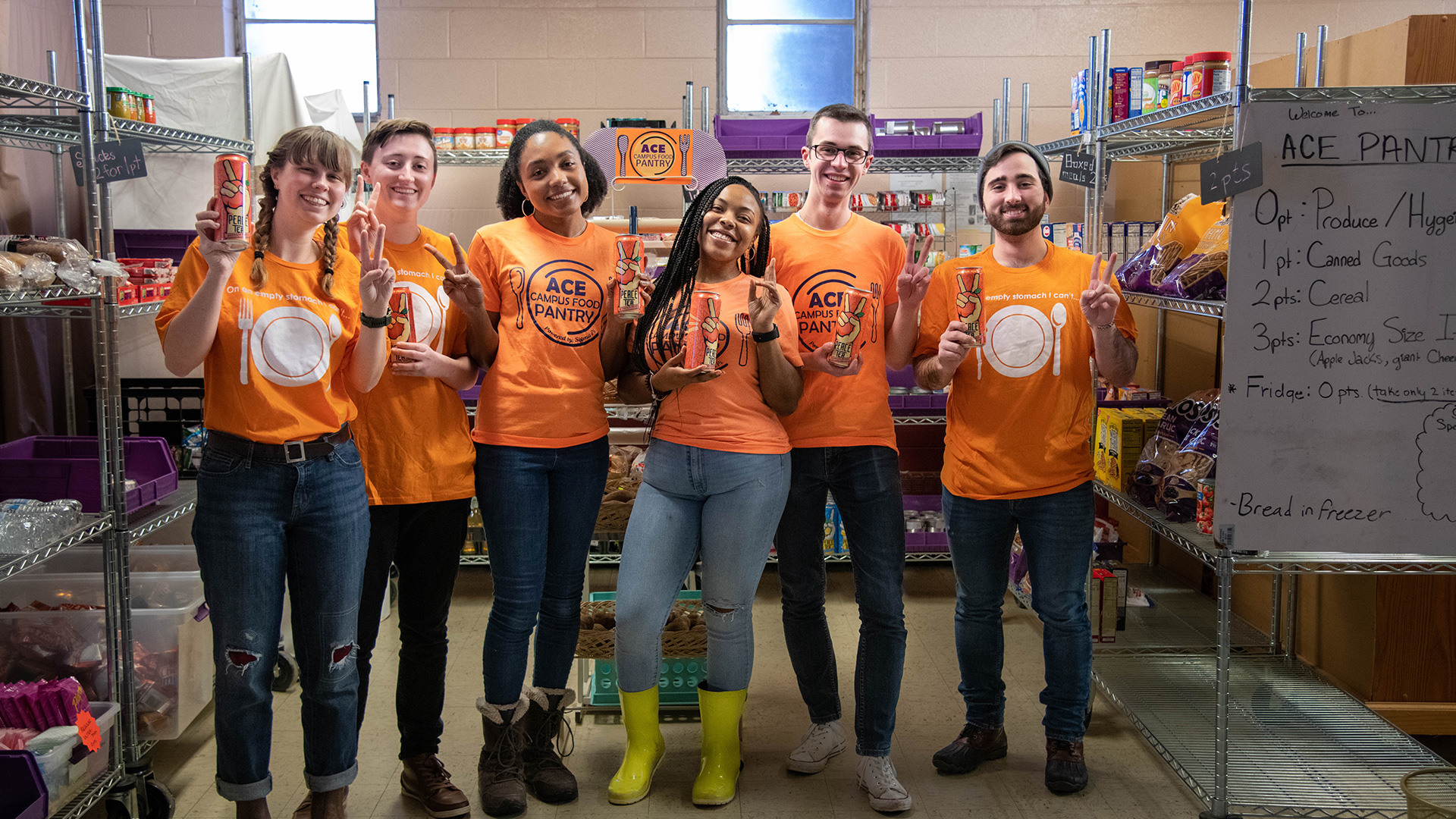
 .
.